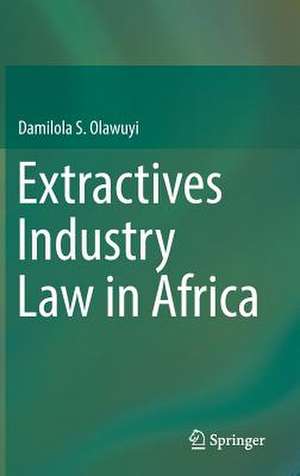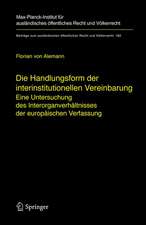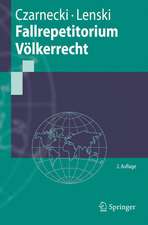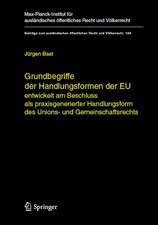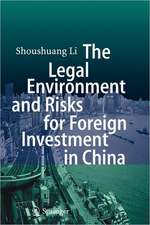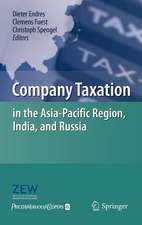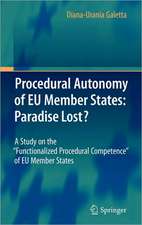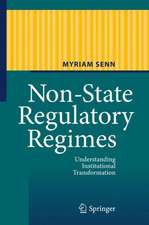Extractives Industry Law in Africa
Autor Damilola S. Olawuyien Limba Engleză Hardback – 22 sep 2018
The book provides a systematic examination of the legal, fiscal and institutional frameworks for the commercial development of petroleum and solid mineral resources in Africa. First, it considers the values, assumptions, and guiding principles underpinning legislation and governance in Africa’s extractive sector. It then provides detailed and comparative evaluations of regulatory frameworks, pricing, local content, procurement, sales, and contractual arrangements across African extractive industries. Further, the book assesses how questions of business and human rights risks, accountability, corporate social responsibility, waste and pollution control, environmental justice, and participatory development have been addressed to date, and how they could be addressed better in the future.
Enhancing readers’ understanding of the geography, sources and scope of extractive resources in Africa, the book explains how corporations can effectively identify, mitigate and prevent legal and business risks when investing in African extractive industries. Lastly, it discusses the innovative legal strategies and tools needed to achieve a sustainable and rights-based extractive industry.
Written in a user-friendly style, the book offers a valuable resource for corporations, investors, environmental and human rights administrators, advocates, policymakers, judges, international negotiators, government officials and consultants who advise on, or are interested in, petroleum and solid mineral investments in Africa. It also offers students and researchers an authoritative guidebook to the current state of extractive industry laws and institutions in Africa. Numerous examples of how international legal norms could be used to help revitalize the underlying legal and fiscal regimes in African extractive industries – to make them more robust, accountable, sustainable and rights-based – round out the coverage
| Toate formatele și edițiile | Preț | Express |
|---|---|---|
| Paperback (1) | 481.71 lei 38-44 zile | |
| Springer International Publishing – 20 dec 2018 | 481.71 lei 38-44 zile | |
| Hardback (1) | 692.31 lei 38-44 zile | |
| Springer International Publishing – 22 sep 2018 | 692.31 lei 38-44 zile |
Preț: 692.31 lei
Preț vechi: 899.10 lei
-23% Nou
Puncte Express: 1038
Preț estimativ în valută:
132.47€ • 138.68$ • 109.61£
132.47€ • 138.68$ • 109.61£
Carte tipărită la comandă
Livrare economică 02-08 aprilie
Preluare comenzi: 021 569.72.76
Specificații
ISBN-13: 9783319976631
ISBN-10: 331997663X
Pagini: 370
Ilustrații: XVII, 354 p.
Dimensiuni: 155 x 235 mm
Greutate: 0.7 kg
Ediția:1st ed. 2018
Editura: Springer International Publishing
Colecția Springer
Locul publicării:Cham, Switzerland
ISBN-10: 331997663X
Pagini: 370
Ilustrații: XVII, 354 p.
Dimensiuni: 155 x 235 mm
Greutate: 0.7 kg
Ediția:1st ed. 2018
Editura: Springer International Publishing
Colecția Springer
Locul publicării:Cham, Switzerland
Cuprins
Part I: Introductory Context and Principles. Introduction - Nature and Scope of the African Extractives Industry - Extractive Sector Infrastructure. Part II: Legal Theories, Contracts and Fiscal Regimes on Extractive Investments in Africa - Ownership and Control of Extractive Resources - Sources of Extractive Industry Law - Regulatory Institutions - Legal Rights and Interests in Resource Extraction - Contractual and Fiscal Arrangements in the Extractive Industry - Local Content and Product Mandating Requirements. Part III: Legal and Business Risks in African Extractive Investments - Environmental Impacts and Risks of Extractive Operations - Business, Human Rights and Corruption Risks.
Notă biografică
Damilola S. Olawuyi is an Associate Professor of Law at HBKU Law School. He is also Chancellor’s Fellow and Director at the Institute for Oil, Gas, Energy, Environment and Sustainable Development (OGEES Institute), Afe Babalola University, Nigeria.
Textul de pe ultima copertă
The book provides a systematic examination of the legal, fiscal and institutional frameworks for the commercial development of petroleum and solid mineral resources in Africa. First, it considers the values, assumptions, and guiding principles underpinning legislation and governance in Africa’s extractive sector. It then provides detailed and comparative evaluations of regulatory frameworks, pricing, local content, procurement, sales, and contractual arrangements across African extractive industries. Further, the book assesses how questions of business and human rights risks, accountability, corporate social responsibility, waste and pollution control, environmental justice, and participatory development have been addressed to date, and how they could be addressed better in the future.
Enhancing readers’ understanding of the geography, sources and scope of extractive resources in Africa, the book explains how corporations can effectively identify, mitigate and prevent legal and business risks when investing in African extractive industries. Lastly, it discusses the innovative legal strategies and tools needed to achieve a sustainable and rights-based extractive industry.
Written in a user-friendly style, the book offers a valuable resource for corporations, investors, environmental and human rights administrators, advocates, policymakers, judges, international negotiators, government officials and consultants who advise on, or are interested in, petroleum and solid mineral investments in Africa. It also offers students and researchers an authoritative guidebook to the current state of extractive industry laws and institutions in Africa. Numerous examples of how international legal norms could be used to help revitalize the underlying legal and fiscal regimes in African extractive industries – to make them more robust, accountable, sustainable and rights-based – round out the coverage.
Caracteristici
The first text to deal exclusively with the underpinning legal and governance regimes on extractive investments in Africa Provides a comparative analysis and overview of extractive industry law and governance institutions across Africa Enables practitioners and students to understand the diverse approaches and distinctive risk points in extractive investments across Africa Provides detailed information on the licensing requirements, participation contracts, legal and contractual risks, and due diligence tools for mitigating risks when investing in African regimes Encompasses current topical issues, such as business and human rights, environmental justice, corporate social responsibility, corporate risk identification and management, as well as multi-stakeholder engagement and accommodation in extractive investments Builds on older and more recent works in this area, which have provided either narrow or dated explorations of legal regimes for extractive investments in Africa
